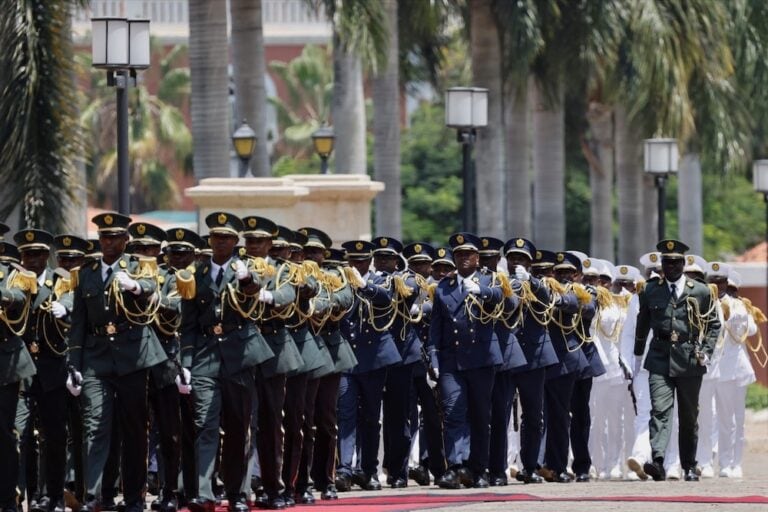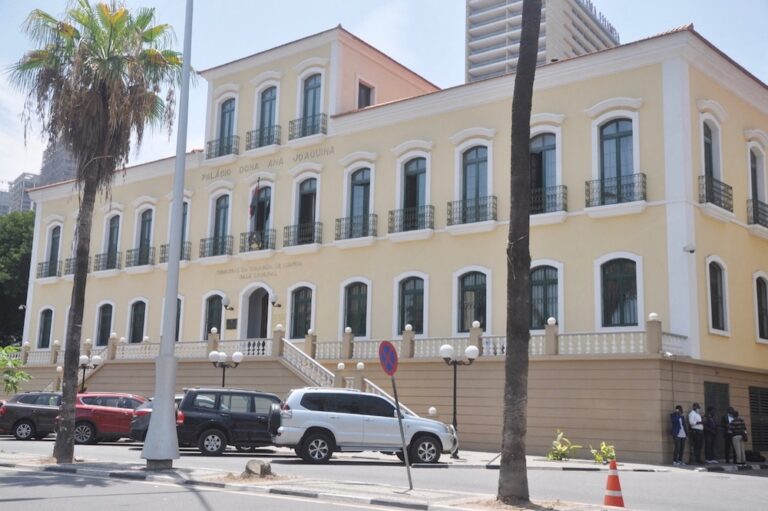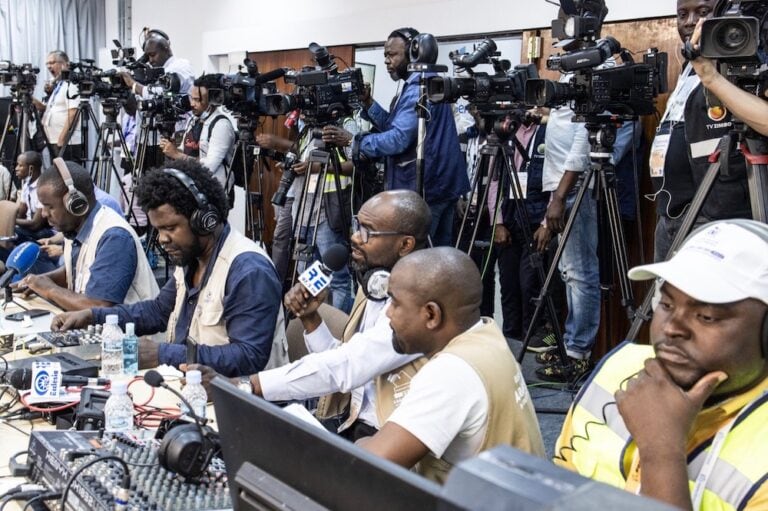Angolan authorities forcibly broke up a peaceful protest on 27 May 2013, denouncing the enforced disappearance of two activists a year ago.Human Rights Watch also expressed concern at the lack of a credible investigation into the disappearances.
Angolan authorities forcibly broke up a peaceful protest on May 27, 2013, denouncing the enforced disappearance of two activists a year ago, Human Rights Watch said today. Human Rights Watch also expressed concern at the lack of a credible investigation into the disappearances.
The police used excessive force against approximately 30 protesters at Luanda’s Independence Square, Human Rights Watch said. The activists were holding a youth vigil for the first anniversary of the disappearances of Isaías Cassule and António Alves Kamulingue. Police beat the protesters with batons and briefly detained a dozen people. One activist, charged with “attempted murder,” remains in custody and has been prevented from speaking to his lawyer.
“The Angolan authorities seem more interested in quashing peaceful protests than in investigating what happened to the two ‘disappeared’ men,” said Leslie Lefkow, deputy Africa director at Human Rights Watch. “This kind of intimidation just raises more questions about the government’s determination to suppress questions about Cassule’s and Kamulingue’s fate.”
Kamulingue and Cassule were abducted by unidentified assailants on May 27 and 29, 2012, respectively, after they organized a protest on May 27 in Luanda by former presidential guards and war veterans over complaints of unpaid salaries and pensions. Youth activists had earlier organized demonstrations in December 2012 and again in March 2013, calling on the government to provide information about the missing men. Under international law, an enforced disappearance occurs when the authorities deprive a person of their liberty but refuse to acknowledge doing so or do not provide information about the person’s whereabouts or fate.
The May 27, 2013, protest started at about 4 p.m. Police barred Independence Square to prevent the gathering, and then beat around 30 protesters who were sitting on the square wearing black. Hundreds of passers-by, many of them students on their way home from school, witnessed the beatings. The police arrested a dozen protesters and released them the same day without charge, except Emilio Catumbela, who was charged with attempted murder and is awaiting trial. Several protesters were mistreated in custody, and one suffered serious injuries to his ribs that required hospital treatment.
The authorities gave Catumbela’s lawyers false information on his whereabouts, effectively depriving him of access to counsel. Salvador Freire of the legal aid group Mãos Livres (Free Hands ) told Human Rights Watch, “The criminal investigation police showed us a letter confirming that he was transferred to the attorney-general’s office, but the attorney-general’s office denied that the detainee who was being charged with ‘bodily harm’ ever arrived there.”
Freire said that after a day going from one office to another, he was told that Catumbela was being interrogated at the 19th Police Station, where he was being charged with attempted murder against the police commander of that area. “Neither the criminal investigation police nor the attorney-general told us the truth,” Freire said. “And during the time I was prevented from contacting him they aggravated the charges against my client, and still don’t let me speak to him.” The youth protester Alemão Francisco told Human Rights Watch that he managed to speak briefly with Catumbela from the window of his cell at the police jail. “He complained he was being mistreated by police agents,” the activist said.
The state news agency Angop reported on May 27 that the police dissolved an illegal and violent protest and were forced to take into custody protesters who threw stones at them. Human Rights Watch spoke with protesters who said that the vigil had been announced in advance to the authorities, in compliance with legal requirements. Witnesses said it was peaceful. Raúl “Mandela”, 27, and “Nicolas”, 31, said that they were beaten in custody, both by other inmates upon orders from the police, and by the police themselves.
“Mandela” told Human Rights Watch:
They took us to the 6th Police Station. There, the police took all our belongings, including our clothes and shoes. We were left only in our underwear. In the courtyard, a dozen police agents beat us with metal cables and handcuffs. I fell on the ground and they kicked us with their boots. Then they put us in a cell with six or more criminals. The commander ordered the cell chief: “Take care of these two.” An inmate said: “You gave a lot of work to the chief. Now we’ll beat you.” They beat us with pans and other things – fists, elbows – for 40 minutes. Then, the commander came and took us out to the courtyard. There, police agents beat us again, until another police agent told them to stop.
“Mandela” said that the police then took them by police car to Cazenga, where they were left at about 8 p.m. on the corner of a dark street. The police returned their clothes, but not their shoes, money, phones, or other belongings. “Mandela” said they managed to borrow money to get home: “I hardly managed to cross the street and fainted. I still can hardly move my right leg and right arm, which are inflamed.
Colleagues later found “Mandela” lying on the ground semiconscious and took him to the hospital, where he was treated for injuries to his ribs.
Angola has experienced an increasing number of public protests since 2011 as first youths, and later civil war veterans demonstrated in the capital, Luanda, and other cities. The youth movement has called for social reforms and the resignation of President José Eduardo dos Santos, now in power for 33 years, while war veterans have been demanding long-overdue social benefits. The authorities have reacted by banning and violently repressing the protests, arbitrarily arresting protesters and holding unfair trials. Police and plainclothes security agents have carried out widespread intimidation and pervasive surveillance.
Since 2011, protesters have lodged numerous complaints with the police regarding violence by plainclothes security agents, and police inaction, in the face of violence against protesters and some journalists and observers. Human Rights Watch is not aware of any credible police investigation into any of those cases.
“Two men have been missing for a year, and the government’s lack of action only heightens concerns about the involvement of the security forces,” Lefkow said. “The government needs to facilitate an independent investigation, including a visit by the United Nations expert on enforced disappearances.”
Crackdowns on Previous Protests
The December 2012 and March 2013 protests on behalf of Cassule and Kamulingue were also announced in advance, in accordance with Angolan law. Nevertheless, at those demonstrations as well, police dispersed the crowd using excessive force, and arbitrarily arrested protesters.
On March 30, 2013, youth protesters planned a march from Luanda’s Sant’Ana Cemetery to Independence Square in central Luanda, both to call on the government to reveal the whereabouts of Cassule and Kamulingue, and to respect “the right to life and to think differently.” A police commander declared to the crowd that he had orders from the government to disperse the crowd. Police temporarily detained at least 18 youths, including several passers-by. The police also threatened to use force against journalists and independent observers who were there to report on the protest, including a Human Rights Watch researcher.
Several protesters who were detained in various police jails told Human Rights Watch that they were interrogated for hours by teams of police and security agents in civilian clothes. They said they were photographed and fingerprinted, and that the police seized their mobile phones and searched their contacts and messages. “The police kept asking us who was behind our protests and accused us of inciting violence and war against the Angolan state,” Nito Alves, an 18-year-old protester arrested on March 30 and on May 27, told Human Rights Watch.
During the December 22, 2012, protest, a group of youths planned to march from Independence Square to the Justice Ministry, but the police barred their way. Rapid intervention police used tear gas to disperse the crowd, beat protesters with batons, and arrested eight people, including several passers-by.
One protester who had been arrested and released without charges, Alemão Francisco, told Human Rights Watch that while in custody, investigative police forced him to give an interview to the state television, Televisão Pública de Angola (TPA). “They passed the message that I took responsibility and apologized for the damage to several cars – but that’s not what I said,” he told Human Rights Watch. On December 28, a judge acquitted all of the protesters for insufficient evidence.
No Credible Investigation of Disappearances
The lawyers for the missing men notified the authorities of their enforced disappearances in October 2012. But the authorities have done little to investigate, Human Rights Watch said. On December 20, Interior Minister Ângelo Tavares, Attorney-General Arcanjo Custódio, General Police commander Ambrósio de Lemos, Criminal Investigation Police Director Eugénio Pedro Alexandre, and Youth Secretary of State Nhanga Assunção invited family members of the missing men, and several youth activists and journalists to an official meeting.
But instead of providing information about the men’s whereabouts or steps that the authorities had taken in the case, the officials denied having any official knowledge of the case and expressed concern for the men.
The criminal investigation police appear to have opened a case only in February 2013. Cassule’s brother told Human Rights Watch that criminal investigation police agents summoned family members to testify in February and tried to intimidate his family to stop speaking to the media and to youth activists.
On March 27, police took into custody the only known witness to Cassule’s abduction, Alberto Santos, a former presidential guard. Santos had described by phone to Human Rights Watch how on May 29, 2012, six security agents in civilian clothes dragged Cassule into their car, while Santos, who was walking with Cassule, managed to escape. He said he had since gone into hiding, fearing abduction. Santos said that the police had never summoned him for questioning as a witness. Santos is still in custody but has not been formally charged.


